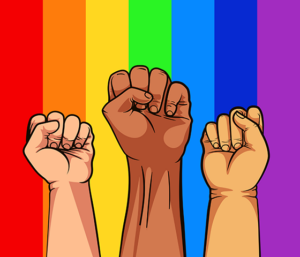
The First Pride Was a Riot
 The first Pride was a riot. In fact, between 1959 and 1969, the year the Stonewall Uprising took place, more than 20 such uprisings occurred between LGBTQ+ people and the police who harassed, threatened, and beat us. Many of these revolts were led by LGBTQ people of color. LGBTQ+ history is frequently the story of fighting government oppression, whether that was violence at the hands of police or intentional neglect as our community was ravaged by HIV/AIDS.
The first Pride was a riot. In fact, between 1959 and 1969, the year the Stonewall Uprising took place, more than 20 such uprisings occurred between LGBTQ+ people and the police who harassed, threatened, and beat us. Many of these revolts were led by LGBTQ people of color. LGBTQ+ history is frequently the story of fighting government oppression, whether that was violence at the hands of police or intentional neglect as our community was ravaged by HIV/AIDS.
It is an understanding of this history that required Pride at Work to issue a strong statement of support for those who are protesting to stop the assault on Black lives. Our community is diverse and our solidarity comes both from a sense of purpose, but also because Black LGBTQ+ lives are at stake as well. Just days after the murder of George Floyd at the hands of Minneapolis police, Tony McDade, a transgender Black man, was killed by police in Tallahassee, Florida. Transgender and non-binary members of our community are still today targeted frequently by police, particularly if they are Black.
When we first started marching in what would become Pride month, there was no rainbow capitalism there to sell us shoes, hats, shirts, booze, etc. In fact, more than a few of those corporations selling us these products today supported(and in many cases still support) policies and politicians that would do our community harm. These are the same politicians who create the policies that over-police Black and brown communities and that create the socioeconomic conditions that make it harder to thrive is you are not white, male, heterosexual, cisgender, and U.S. born.
A history of violence at the hands of police is something both Labor and the LGBTQ+ community share with the Black community. This is why it’s so important for the Labor movement to lead in this time. There is no better check to corporate greed and government power than the Labor movement and we must wield our collective power in this moment. The Labor movement has a duty to ensure that unions are not the impediment to prosecuting and removing abusive cops as much as we have a duty to lift up and improve the lives of marginalized workers.
As we’ve seen during this coronavirus crisis, it’s average everyday working people who are essential to keep our economy running. Many of those essential workers are union members – and many others could become so if we chart the right course. When working people come together, we can change the course of this country.
We’ve done it before. Let’s do it again.
